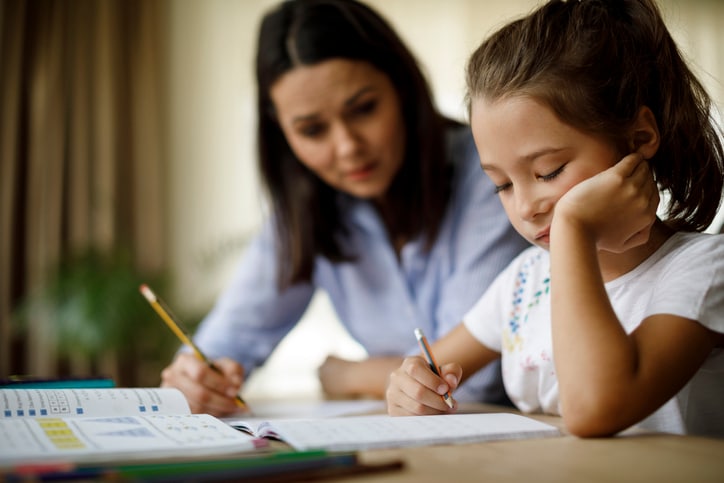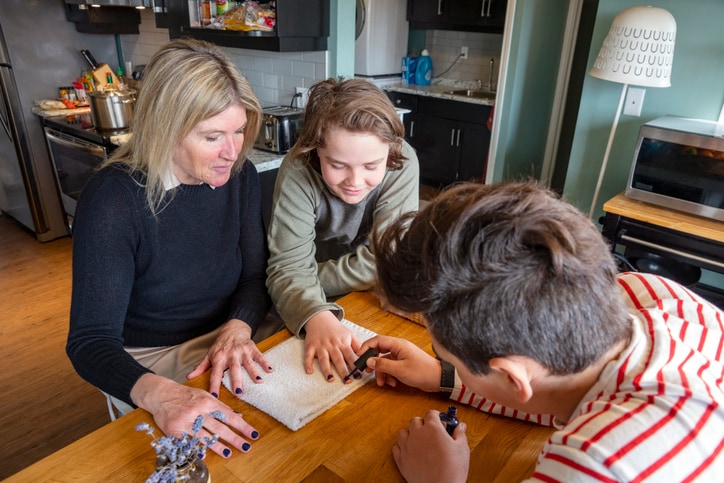Just like backpacks or sharpened pencils, homework is considered essential in many schools. But that hasn’t stopped a lot of teachers and parents from questioning whether or not assigning homework is actually beneficial to students. Amy DeAngelo, a teacher, recently tweeted her “unpopular opinion” that school work should be only be done at school, and her strong stance spurred an important conversation about the real problems with assigning homework.
“Potentially unpopular opinion: if you can’t teach the whole curriculum without homework, your curriculum is the problem,” DeAngelo writes. “Kids aren’t ‘quiet quitting’ by expecting to only do work at school. After seven to eight hours of work, they should expect to protect their peace and find joy when they leave.”
DeAngelo adds that her stance on homework doesn’t apply to activities like nightly reading, so long as what kids are reading is “100% the choice, and they don’t have to do reading logs or book reports at home.” She also acknowledges that teachers don’t always have control over the curriculum they’re required to use.
Her tweets echo a growing number of teachers who are rethinking homework and the impact it has on kids. In recent years, more and more teachers have adopted no-homework policies or drastically cut the amount they assign. Parents are also a part of the no-homework movement, with one mom writing for The Washington Post that she’s completely “opted out of homework for my young children.”
Why are parents and teachers passing on homework?
A growing body of research shows some inherent flaws in how homework is assigned and carried out. Beginning in 2013, researchers at Stanford found too much time spent on homework contributes to increased stress, physical health problems and even social isolation for students. Another study published in 2015 found that when kids do more than 90-100 minutes of homework per day, their test scores in mathematics and science may actually decline.
In 2016, the American Psychological Association published a review of research on homework, including insight into the systemic inequalities that may be exacerbated by assigning homework. For example, kids from wealthier families may have better access to resources, like computers and reliable WiFi, that other students do not. One Pew survey found that one in five teenagers ages 13-17 said unreliable internet access impacted their ability to do homework even prior to the pandemic.
In addition to inequalities in tech access, some kids also may not have a quiet place to complete homework or parents or caregivers that are readily available to help them complete assignments. In 2021, a popular teacher on TikTok addressed such inequalities while explaining his own no-homework policy.
“In my opinion, the whole premise of homework is flawed,” he says. “Some students go home to a crowded house full of siblings and they have to babysit those siblings because their parent is a single parent and is working two jobs all day. On the other hand, some students go home to an environment that’s nice and quiet. I can’t see any way I can justify grading those [students] on an even playing field.”
Two sides of the homework debate sound off
DeAngelo’s tweet drew responses from hundreds of parents and teachers who fall on all sides of the homework conversation. Many agreed with her stance that school work should be completed during school hours only.
“Bravo!! I agree with you 100%,” one teacher writes. “Homework, especially in the younger grades, is completely useless, and I’ve thought this for my entire career as a teacher. Other than independent reading on an honor system, I don’t assign any homework.”
“I’m a psychologist, and a really smart kid once told me: If my dad came home and did work, they would call him a workaholic and a bad dad. When I don’t do work at home, they call me lazy and unmotivated,” another person adds.
Some people even shared how much they benefitted from having teachers who didn’t assign homework in school. “My favorite teacher of all time was a physics teacher who never assigned homework over weekends,” one person writes. “He said he didn’t work on the weekends, and we shouldn’t have to either. He had a record number of students go on to major in physics.”
But DeAngelo’s post also struck a nerve amongst people who believe homework teaches important skills, like how to study, and helps kids get extra practice in difficult subjects.
“I have to disagree,” one person writes. “We teach, they practice at home, then collaborate for meaningful use of knowledge gained. When we started teaching skills in isolation we lost the enthusiasm of kids. The skills aren’t the goal, the knowledge is. So they have to practice skills at home.”
“As a math teacher, my homework assignments were a way to reinforce what was taught,” another teacher adds. “Tried to have 10 minutes for students to start where I could help if necessary. Homework was not punishment or what I call a time usurper. [It] should take 15-25 minutes total.”
While there’s no clear consensus on whether to assign homework, it’s obvious that the issue is complex and worthy of examination by educators at all levels. Despite the differing opinions on homework, DeAngelo urges educators to look at the bigger picture and consider kids’ mental well-being.
“In any K-12 building, kids are forced to be there for the full day and their schedule, emotions and decisions are out of their control,” she writes. “They bounce from subject to subject all day. They are mentally, physically and emotionally drained by the last bell. They need rest.”






